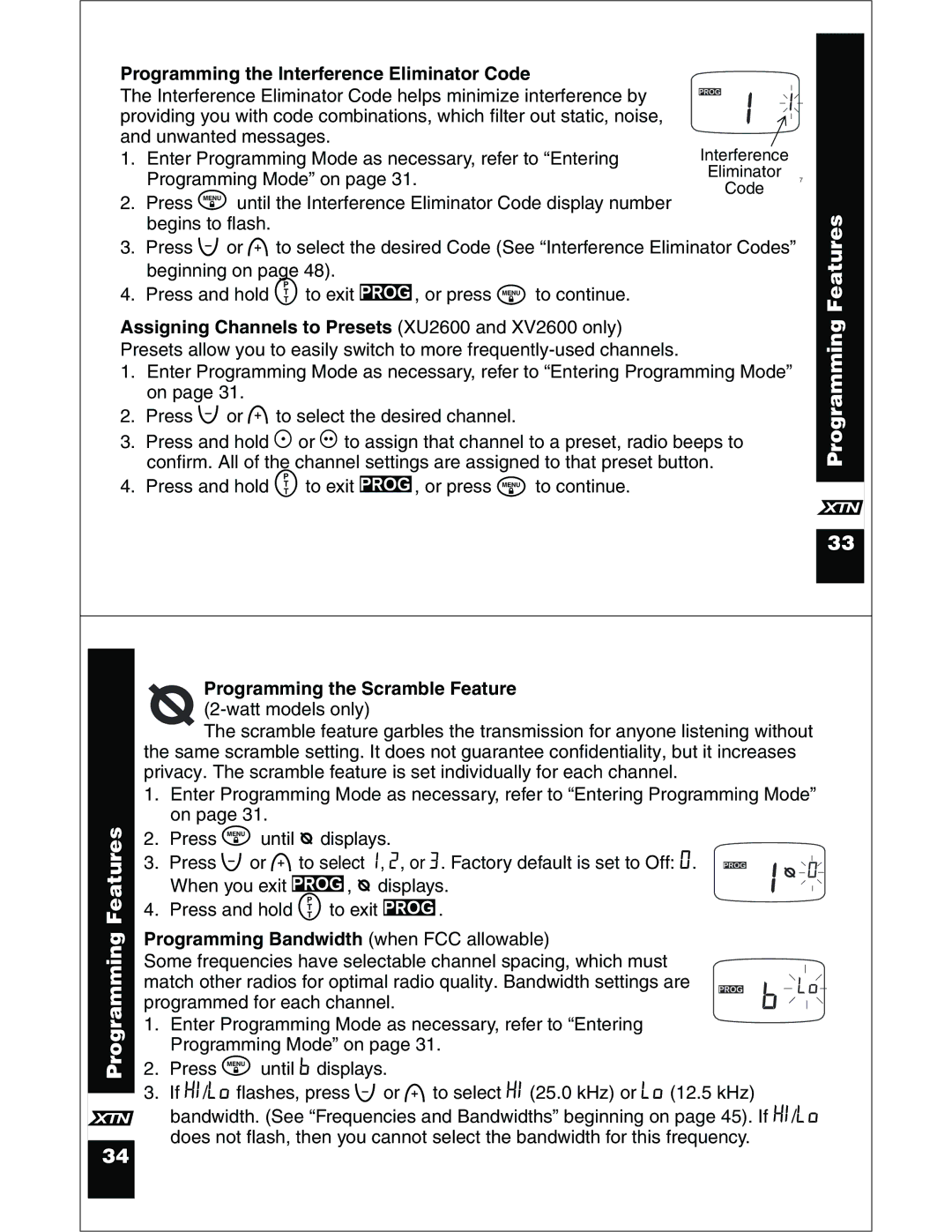
Programming the Interference Eliminator Code |
|
|
|
|
| |
The Interference Eliminator Code helps minimize interference by |
|
|
|
|
| |
|
|
|
|
| ||
providing you with code combinations, which filter out static, noise, |
|
|
|
|
| |
|
|
|
|
| ||
|
|
|
|
| ||
and unwanted messages. | Interference | |||||
1. | Enter Programming Mode as necessary, refer to “Entering | |||||
| Programming Mode” on page 31. | Eliminator | 0107 | |||
| Code | |||||
2. | Press \ until the Interference Eliminator Code display number |
|
|
| ||
|
|
|
|
| ||
| begins to flash. |
|
|
|
|
|
3. | Press [ or ] to select the desired Code (See “Interference Eliminator Codes” | |||||
| beginning on page 48). |
|
|
|
|
|
4. | Press and hold M to exit k, or press \ to continue. |
|
|
|
|
|
Assigning Channels to Presets (XU2600 and XV2600 only) Presets allow you to easily switch to more
1.Enter Programming Mode as necessary, refer to “Entering Programming Mode” on page 31.
2.Press [ or ] to select the desired channel.
3.Press and hold T or S to assign that channel to a preset, radio beeps to confirm. All of the channel settings are assigned to that preset button.
4.Press and hold M to exit k, or press \ to continue.
Programming Features
X
33
Programming the Scramble Feature
The scramble feature garbles the transmission for anyone listening without the same scramble setting. It does not guarantee confidentiality, but it increases privacy. The scramble feature is set individually for each channel.
| 1. | Enter Programming Mode as necessary, refer to “Entering Programming Mode” |
| ||||||||
|
| on page 31. |
|
|
|
|
|
|
|
|
|
Features | 2. | Press \ until e displays. |
|
|
|
|
|
|
|
|
|
3. | Press [ or ] to select 1, 2, or 3. Factory default is set to Off: 0. |
|
|
|
|
|
|
|
|
| |
|
|
|
|
|
|
|
|
| |||
e |
| 0 |
|
|
| ||||||
| When you exit k, e displays. |
|
|
|
| ||||||
|
|
|
|
|
|
|
|
|
| ||
4. | Press and hold M to exit k. |
|
|
|
|
|
|
|
|
| |
|
|
|
|
|
|
|
|
|
|
| |
Programming | Programming Bandwidth (when FCC allowable) |
|
|
|
|
|
|
|
|
| |
Some frequencies have selectable channel spacing, which must |
|
|
|
|
|
|
|
|
| ||
|
|
|
|
|
|
|
|
| |||
match other radios for optimal radio quality. Bandwidth settings are | K |
|
| C |
|
| |||||
programmed for each channel. |
|
|
|
| |||||||
|
|
|
|
|
| ||||||
|
|
|
|
|
| ||||||
1. | Enter Programming Mode as necessary, refer to “Entering |
|
|
|
|
|
|
|
|
| |
| Programming Mode” on page 31. |
|
|
|
|
|
|
|
|
| |
2. | Press \ until K displays. |
|
|
|
|
|
|
|
|
| |
| 3. | If D/C flashes, press [ or ] to select D (25.0 kHz) or C (12.5 kHz) |
|
|
|
|
|
|
|
|
|
Xbandwidth. (See “Frequencies and Bandwidths” beginning on page 45). If D/C
does not flash, then you cannot select the bandwidth for this frequency.
34
